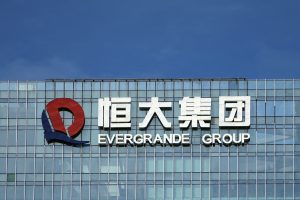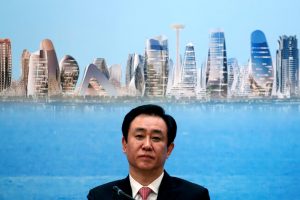All eyes are on Chinese developer Zhongliang Holdings as it seeks to extend the repayment on notes worth $729 million by next week, as its failure would intensify investor worries about China’s property debt crisis.
Even if Zhongliang wins approval to extend by another year, the company would need to pay an additional $1.25 million on its bond coupons now due to a weaker yuan.
“The situation is definitely more severe this time,” said Zhongliang’s chief financial officer Albert Yau, comparing current conditions with the yuan’s last major decline in 2018.
The Shanghai-based company has struggled to sell enough houses amid a sustained property downturn or secure refinancing to pay investors who are due full redemption on their bonds in May and July.
For other cash-strapped issuers with heavier debt burdens, additional repayment costs due to the currency swing could be much larger.
Unlike the 2018 tumble, developers are now unable to refinance offshore after a series of defaults by other issuers in the troubled sector made new debt raising impossible. That means repayments would need to be transferred from onshore yuan accounts.
ALSO SEE: China Issues New Bond Rules to Help Struggling Companies
Delaying Maturities
Zhongliang asked holders of its May and July 2022 notes in late April to delay the maturities by exchanging their bonds for new issuance due next year.
Bondholders have until late Monday to give their consent, a deadline extended from May 10. Failure to secure 90% approval would likely result in a default.
“We expect it will take a longer period of time for sales to recover – it’s a long-term battle,” Yau said, adding the developer’s business in 40% of the coastal cities were disrupted because of the lockdowns.
A sharp slowdown in home sales in the world’s second-largest economy and a weaker yuan are set to pile pressure on property developers already struggling to repay debt and raise fresh capital.
An over 6% drop in the yuan has made offshore debt maturities worth around $20 billion for rest of the year more expensive for developers, some of whom have already defaulted on their repayment obligations this year.
Renewing Investor Concerns
Sunac on Wednesday became the latest developer to fail make dollar bond payments in the recent months, renewing investor concerns about the sector that accounts for a quarter of the country’s economy.
The developers, who were hoping for the market to bottom out in the second quarter, are revising down investor expectations for full-year sales after posting a 50% plunge in the first four months, with no demand rebound seen in the near future.
A developer based in Guangdong province said city curbs not only hurt short-term sales but also affect longer-term purchasing power with potential buyers feeling insecure about their jobs.
The mounting challenges for the developers come against the backdrop of repeated assurances by the Chinese policymakers and regulators to ensure healthy sector development by avoiding defaults and efforts including banks extending loans.
“It is indeed a double whammy situation that they will face, not only about this weaker revenue but on the other hand it’s this weaker currency plus higher yield,” said Gary Ng, Asia Pacific senior economist of Natixis.
- Reuters, with additional editing by George Russell
READ MORE:
China’s Politburo Takes Pro-Developer Stance – Nikkei Asia
China Developers Speed up Diversification After Debt Crisis
China Developer Zhenro Defaults on Two Offshore Bonds
























